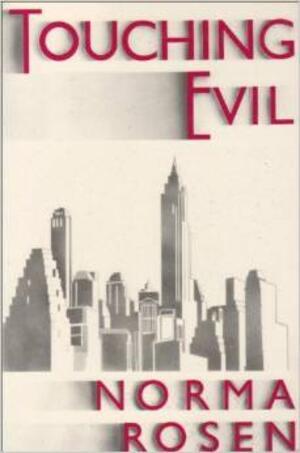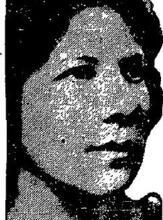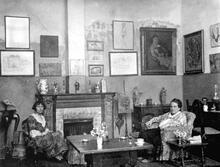Norma Rosen
In her novels and essays, Norma Rosen found new and powerful ways to approach the difficult questions detailing American Jewish life. Rosen published her first novel, Joy to Levine!, in 1962. She began teaching at various universities in 1965, including New York University, Columbia, Barnard, Harvard, and Yale. Although she was raised secular, Rosen’s later writings explored Jewish history and religion. Her study of the Holocaust informed Touching Evil (1969) and her research on compassionate rabbinic stances on abortion informed At the Center (1982). In 1992 Rosen published her first collection of essays, Accidents of Influence, which discussed topics ranging from suburban motherhood to Jewish feminism. In 1996 she also published a collection of midrashim called Biblical Women Unbound: Counter-Tales, exploring midrash as a literary genre and a theological inquiry.
In a 1974 essay, “The Holocaust and the American-Jewish Novelist,” Norma Rosen asked rhetorically: “Must we tell stories that reflect the Holocaust...? Can’t we just leave it out?” Among the earliest American novels to grapple with the impact of the Nazi genocide upon Jews and Western culture, Rosen’s most celebrated novel, Touching Evil (1969), is part of the author’s growing body of work that imaginatively explores being a Jew and a woman in contemporary urban America. Compelled, as a Jewish writer, by the injunction to remember, “Zakhor,” Rosen’s fiction and essays examine ethics, motherhood, and faith after the Holocaust, as well as Jewish identity, feminism, texts, and practices.
Family and Education
Born on August 11, 1925, in the Jewish neighborhood of Borough Park in Brooklyn, New York, Rosen was a product of what she describes as “an immaculate Jewish conception.... My parents, who were Jews by birth, refrained from intercourse with the Jewish religion and proudly passed me, in an untainted state, into the world.” The only child of American-born Louis Gangel, a businessman, and Rose (Miller) Gangel, Norma absorbed Jewish culture and cadences from the Brooklyn milieu of her early childhood, and from her grandparents’ Yiddish-speaking household. She received no formal Jewish education, and her parents discouraged questions about European roots or Jewish practice. Her mother resented the diminished role of women in the synagogue and refused to attend services on High Holidays.
Norma moved to Manhattan with her parents and attended Julia Richmond High School. She studied literature and dance at Mount Holyoke College, graduating cum laude and Phi Beta Kappa in 1946. She continued to study dance with José Limón and Martha Graham and taught English and dance at the private Riverdale School. In 1953, she received an M.A. in English from Columbia University for her thesis on the novels of Graham Greene. She began working in book production at Harper & Row in 1954, quitting to write full-time in 1959 when her first two published stories appeared in Commentary and Mademoiselle. (Initially she published briefly under the name of Norma Stahl.) Her first novel, Joy to Levine!, was published three years later under the name Norma Stahl Rosen.
Marriage and Exploration of Jewish Identity
On August 23, 1960, after a brief first marriage, she married Robert S. Rosen, a professor of modern languages at Baruch College. Their daughter, Anne Beth, was born in 1961, and their son, Jonathan Aaron, in 1963. Beginning in 1965, Rosen taught creative writing at the New School for Social Research in New York, the University of Pennsylvania, Harvard University, Yale University, Columbia University, the Tisch School of Dramatic Writing at New York University, and other institutions. From 1971 to 1973, she was a fellow at Radcliffe College’s prestigious Bunting Institute. She received the Eugene F. Saxton Award and in 1975, she was awarded the New York State Creative Artists Public Service Grant.
Born in Vienna in 1924, Rosen’s husband escaped the Nazi genocide on a children’s transport to England in November 1938. His parents did not survive. In contrast to Norma Rosen, Robert Rosen observed The Jewish dietary laws delineating the permissible types of food and methods of their preparation.kashrut [dietary laws] and attended synagogue; moreover, he had received an extensive Jewish education. His experiences impelled his wife to confront the Jewish past, and she began to study Jewish philosophy and history, becoming interested in Jewishness not only as a demographic accident but as an ongoing search for meaning. Rosen moved to Brookline, Massachusetts, where she attended the weekly shiurim [study sessions] of Rabbi Joseph Soloveitchik, encountered a women’s prayer service, and began to incorporate Jewish concepts into her writing.
Later Essays and Literary Legacy
Rosen’s novels are governed by ethical and philosophical issues in concrete contexts, as well as the intricacies of domestic life and intimate relationships. A sharp sense of observation and a keen sense of humor inform much of her writing. In Touching Evil, which took Rosen six years to write, the two non-Jewish protagonists become what she calls “witnesses-through-the-imagination” by watching the Adolf Eichmann war-crime trials on television or seeing photos of a death camp. Central to the novel is the question Rosen articulated elsewhere: “How can we live now?” At the Center (1982) utilizes traditional Jewish texts and motifs such as the akeda [the binding of Isaac] to explore the theological crisis of a daughter of Holocaust survivors who are later murdered in New York. Set in an abortion clinic, the novel also examines those ethical issues related to abortion, and the effect on the domestic and inner lives of physicians and patients. The novel emerged out of a series of interviews Rosen conducted for the New York Times Magazine, which led her to study rabbinic responses on abortion. Struck by the rabbinic compassion for, rather than judgment of, the woman’s situation, Rosen came to see Judaism afresh.
In 1973, Rosen left the safety of fiction to write “unprotected” essays. Her first collection, Accidents of Influence: Writing as a Woman and a Jew in America (1992), charts her growing self-awareness as a Jew, a feminist, and an intellectual. In a remarkable range of subject matter, Rosen reflects on the difference between urban and suburban motherhood, the absence of Jewish content in Western culture, the impact of the Holocaust, the evolution of a distinct Jewish American culture, and Jewish feminism. In one essay, she imagines French philosopher and apostate Simone Weil entering a synagogue as did Franz Rosenzweig, but instead of becoming inspired, as he was, to reclaim Judaism, she emerges resentful of the subservience of women.
A member since its inception in 1987 of the Genesis Seminar for writers and scholars at the Jewish Theological Seminary, Rosen completed a collection of midrashim on biblical women, Biblical Women Unbound: Counter-Tales (1996). Citing a biblical passage and its textual problems, each A type of non-halakhic literary activitiy of the Rabbis for interpreting non-legal material according to special principles of interpretation (hermeneutical rules).Midrash enacts a dialogue with ancient rabbinic writers, while engaging with contemporary questions. The book explores midrash as both a literary genre and a theological inquiry.
Norma Rosen died on September 21, 2021. At the time of her death, she had been working on a memoir.
Selected Works by Norma Rosen
Accidents of Influence: Writing as a Woman and a Jew in America (1992).
At the Center (1982. Reprint, 1996).
Biblical Women Unbound: Counter-Tales (1996).
A Family Passover, with Anne Rosen and Jonathan Rosen (1980).
Green: A Novella and Eight Stories (1967).
John and Anzia: An American Romance (1989. Reprint, 1997).
Joy to Levine! (1962).
“The Lovemaking of I.B.Singer.” Commentary (March 1996).
Touching Evil (1969. Reprint 1990).
Goldberg, Marilyn. “The Soul-Searching of Norma Rosen.” Studies in American Jewish Literature 3 (1983): 202–211.
Klingenstein, Suzanne. “Norma Rosen.” In Jewish American Women Writers: A Bio-Bibliographical and Critical Sourcebook, edited by Ann Shapiro et al. (1994).
Rosenberg, Ruth. “Norma Rosen.” Dictionary of Literary Biography. Vol. 28: Twentieth Century American Jewish Writers, edited by Dan Walden (1954): 248–252.





